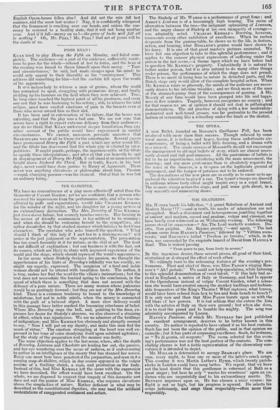THE .ORATORIOS.
MR. IT 1WES lieads his bills thus, "A grand Selection of Ancient and Modern Music ! ! ! "—and in truth, his marks of admiration are not misapplied. Such a discordant and heterogeneous jumbling together of ancient and modern, sacred and profane, vulgar and classical, we have hardly ever witnessed as on Wednesday evening. The following pieces stood in succession—" Air, The Lord worketh wonders. Du- etto, Non palpitai. Air, Rejoice greatly :"—and again, "The last solemn scene from HAYDN'S Passione," followed by " Vittima sven- turata," and BARNETT'S ballad "Freshen ye breezes," which, in its turn, was succeeded by the exquisite lament of David from HANDEL'S Saul. This is indeed passing " From grave to gay, from lively to severe."
By this ingenious device, these several pieces, all good of their kind, neutralized or destroyed the effect of each other. We willingly turn to the redeeming ibatures of the evening's per- formance. First and chief of these, was Miss PATON'S singing Ros- SINI'S " Ah ! pietade." We could not help ejaculating, while listening to this splendid demonstration of vocal talent, " If this lady had ar- rived in England, a native of Italy or Germany, and had to appear at the Operahouse instead of vulgar Covent Garden, what a sensa- tion she would have created among the monkey lordlings and fashion- able frequenters of the King's Theatre ! What raptures, what bravos, would have been echoed from box to box and from bench .to bench r. It is only now and then that Miss PATON bursts upon us with the full blaze of her powers. It is but seldom that she enters the lists with the artistes of Italy on their own ground ; but when she does, it is to rival the proud and to humble the mighty. The song was admirably accompanied by LODER. HAYDN'S Passione, of which Mr. NOVELL() has just published an excellent arrangement, deserves to be better known in this country. Its author is reported to have valued it as his best oratorio. Such has not been the opinion of the public, and in that opinion we coincide ; but it has parts of surpassing excellence. Such, for instance, as " Tu di grazia, sei sorgente." The scena selected for this even- ing's performance was not the best portion of the oratorio. The con- cluding chorus is but a feeble representation of the elementary con- vulsion it is intended to depict. Mr. MILLAR is determined to occupy BRAHAM'S place. We are sure, every night, to hear one or more of the latter's crack songs. This evening it was Martin Luther's Hymn, which twenty pari.41- clerks in London could have sung better. We repeat, that we have not the least doubt that this gentleman is esteemed at Bath as a great singer; but here he only "wastes his sweetness" upon an au- dience who are ungratefully deaf to his extraordinary merits. Mr. BENNETT improves upon us. He has chosen a wiser course : his flight is not so high, but his progress is upward. He selects his songs judiciously, and sings them respectably—often more than respectably.


















 Previous page
Previous page